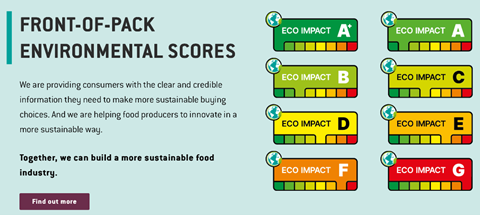
The UK is on collision course with the EU over plans for the launch of eco labels on the front of packs of food and drink products.
In a joint letter to the European Commission and the Westminster government this week, a coalition of MEPs and senior opposition figures from UK parliament claimed having rival, post-Brexit systems was a recipe for mass confusion and would risk schemes losing credibility with the public.
The intervention has come just weeks after four leading supermarkets announced the launch of pilots of a UK front-of-pack system spearheaded by the IGD. It plans to combine scores and a colour-coded system on front of pack to illustrate the environmental impact of products.
Co-op, Morrisons, Sainsbury’s and Tesco are piloting the new label over the summer, with plans for a wider industry rollout as early as next year.
The government is currently reviewing front-of-pack labelling in the UK, with PM Boris Johnson having described it as an opportunity for the UK to wrestle back control from previously EU-dictated labelling.
However, there are also existing rival schemes to IGD’s, including Lidl’s use of an Eco-Score label on many of its own-label products.
Another system, Foundation Earth, has been trialling its own front-of-pack scheme in the UK and in Europe, backed by companies including Nestlé, M&S, Co-op, and Sainsbury’s, all of which have now vowed to support the IGD version in the UK.
Foundation Earth is among those behind this week’s letter, which is also backed by a vice president of the European Parliament, MEPs from three European Parliament committees, as well as MPs from all major UK opposition parties.
They include former shadow climate change secretary Barry Gardiner, Liberal Democrat climate change spokeswoman Sarah Olney and SNP environment and rural affairs spokeswoman Deidre Brock.
The letter calls on all stakeholders to “engage openly, inclusively and collaboratively to find the optimised and harmonised solution we crave”.
“Environmental labelling of food should also be based upon the foundations of life cycle assessment, use as much primary data as possible, and allow products to be compared based upon credible and robust product-specific data,” it adds.
“It is encouraging that technical solutions will soon be available to make such a system a reality and that research is already being compiled on how consumer behaviour can be affected by environmental scoring.
“Any environmental labelling system that falls short on these core principles not only risks failing to gain the trust of consumers but would not provide food and drink producers with the product level information they require to introduce sustainable innovations through their supply chains.”
The clash with the EU over labelling adds to the fallout from the government’s response to Henry Dimbleby’ s National Food Strategy, which included plans for the launch of a Food Data Transparency Partnership.
It will look to provide consumers with information about the health hand environmental impacts of products, via an agreed set of metrics, with ministers hoping it will roll out in the UK by next year.
Sources have suggested it is highly unlikely the UK will want to harmonise the system with the EU but warn that a divergence of approach could have disastrous consequences from exporters to Europe.
However, IGD CEO Susan Barratt welcomed the government’s plans. “This will include developing a mandatory methodology that must be used by those who want to produce eco labels or make claims about the sustainability of their products,” she said.
“We welcome the aim to develop a mandatory methodology that must be used by those who want to produce eco labels. This will build on the work IGD is leading with Defra, the wider industry and Wrap in developing a uniform approach to environmental labelling for the UK food sector.”
IGD said it was working with 20 leading organisations across industry and the University of Leeds to collaboratively test behaviour change levers in real-life settings.
“The trials take us on the journey of realising our longer-term ambition, to establish what levers truly inspire sustained behaviour change and help our industry to adopt best practice and create wide-reaching social impact,” added Barratt.







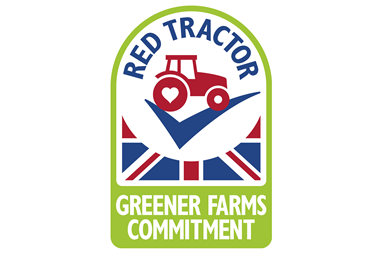
![NewPackshot Group_Landscape[47]](https://dmrqkbkq8el9i.cloudfront.net/Pictures/380x253/8/5/8/283858_newpackshotgroup_landscape47_806533_crop.jpg)

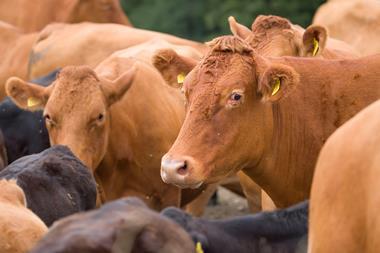


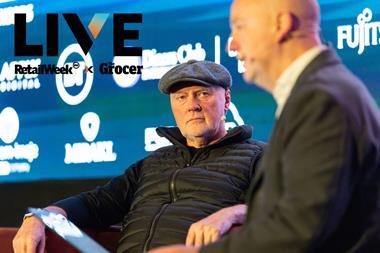
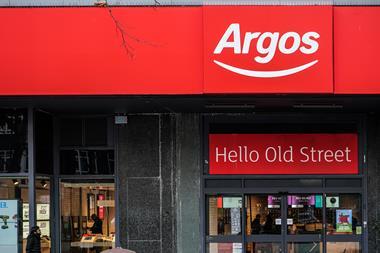

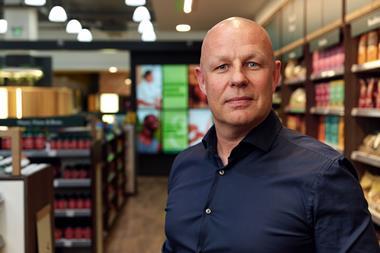


2 Readers' comments